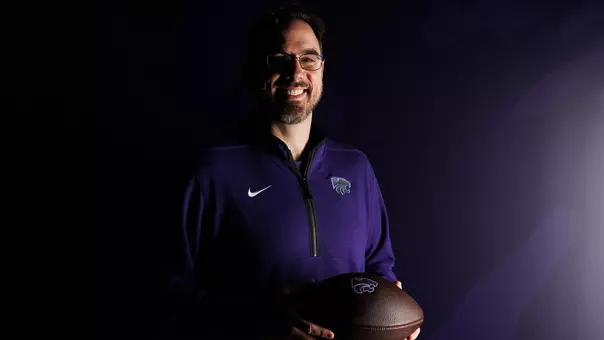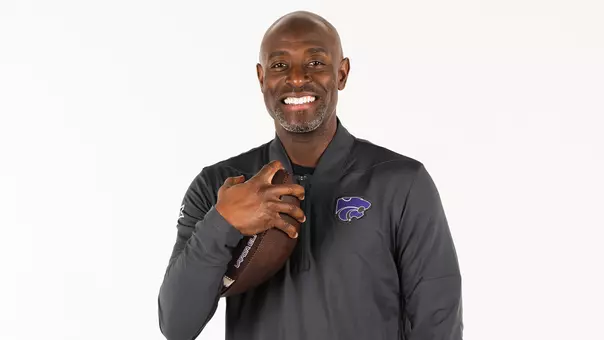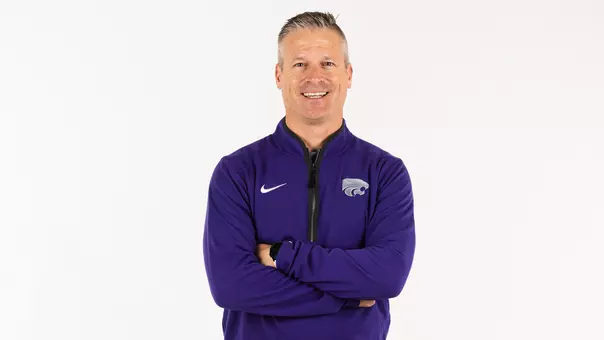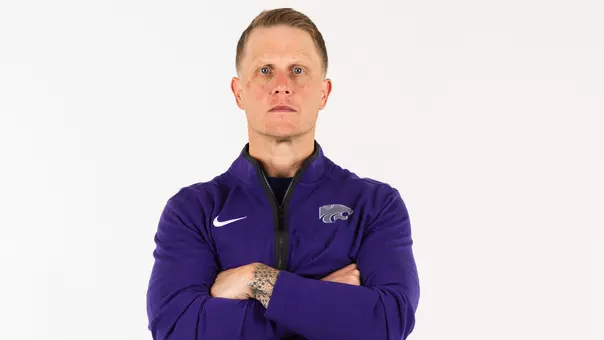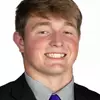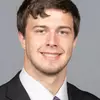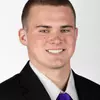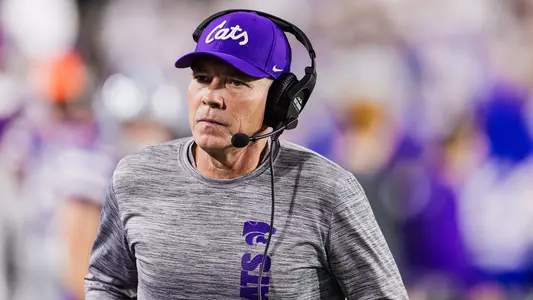
Kaczor Enjoying the College Experience
Jun 16, 2025 | Football, Sports Extra
By: D. Scott Fritchen
Nate Kaczor is pumped. Not because of any titles next to his name — special teams coordinator and special assistant to the head coach — but because the 16-year NFL assistant coach learned something about himself during his first season at Kansas State.
"What I learned about myself is I always thought that I'd enjoy coaching at any level of football," Kaczor says. "Now I know I can."
It had been 25 years since Kaczor coached in college football and as offensive assistant at Utah State from 1991 through 1999 he crossed paths with Matt Wells (current K-State offensive coordinator) and Mike Tuiasosopo (current defensive tackles coach).
Little did the native of Scott City, Kansas, know that his journey would take him to the Jacksonville Jaguars (2008-11), Tennessee Titans (2012-15), Tampa Bay Buccaneers (2016-18) and Washington Commanders (2019-23).
He's coached Pro Bowlers. He's coached record-setters.
But the job isn't finished in Manhattan.
"When you mix talent in with blue-collared, humble, hard-working approach, that's when you really got something," he says. "That's what K-State has. It's a real thing."
Nate Kaczor spoke with K-State Sports Extra's D. Scott Fritchen about a summer filled with recruiting, his thoughts on the place-kicker and punter positions for 2025, and his transition from the NFL to college football.

D. Scott Fritchen: What was this past weekend like from a football and recruiting standpoint?
Nate Kaczor: We had football camp and then recruits arrived for official visits Thursday night and were here Friday and left Saturday. This time of year, we almost always have one item on our calendar other than our normal preseason recruiting and scouting our first four opponents. We have recruiting, camps, our own players to take care of, and then getting ready for the next several opponents for next year.
Fritchen: What does an official recruiting visit look like for you? What all does it entail?
Kaczor: What Coach Chris Klieman and Clint Brown (director of roster management) and our recruiting department have me do is I talk to all the players and whoever is with them — their parents, uncles, aunts — that are not offensive linemen, not quarterbacks and not defensive tackles. Every other position I have a block of time that the recruiting department gives me to talk to them about how special teams is going to be a part of their existence and experience here, and how most of these players these days probably have some aspirations to go onto the NFL, and how with some experience at that level, how it's going to help them when they arrive at the next level if that happens.
Fritchen: Given your NFL credentials, how receptive are college recruits to special teams?
Kaczor: The one thing I've realized and have noticed is when you have a lot of experience at a high level of football that they aspire to get to, that you do get their attention, obviously, at first. The one thing I know, whether it's our own team or recruiting, that your resume, so to speak, might get your foot in the door in terms of engaging them or relating to them, but then what you do with that is what matters. They're either going to go, "Oh wow, this guy knows what he's talking about," or, "Man, I don't care where he's been, I'm not about this." If you don't capitalize on your experience then you're going to lose them anyway in terms of being engaged in the conversation, but it's definitely a good ice breaker.
Fritchen: How easy is it for you to engage them given the fact in the NFL you might not do that much recruiting?
Kaczor: You know what? Interestingly, it is very similar to doing the Combine interviews. So, I get myself in a place mentally — we're finding out about them also, so I'm kind of gathering information on what's important to them. Recruiting is such a united front these days. There are people in our recruiting office who are talking to these guys, we're talking to these guys as coaches, the position coach, the coordinator, Clint Brown, the head coach. So, they have a lot of people from K-State touching their lives, so to speak, in terms of contact.
When I find out, what schools interest them, I'm coming from a naivete standpoint, because I'm not on the road recruiting, but I know a lot about these guys because we have staff meetings to discuss them in detail. But I can project a little bit of naivete like, "Now, what are you looking for?" When I hear someone describe that to me, that's where my experience interviewing people for the NFL Draft kind of comes into play. I think I can get a decent feel for what makes someone tick a little bit. If that can help us in our evaluation process, that's also a piece of it.
Fritchen: How is a college offseason different than a NFL offseason?
Kaczor: The coaches on the road is similar because the coaches in the NFL will go on the road and work out players that the road scouts have identified for them to work out. So, there's some traveling also. The NFL has 30 visits before the draft, meaning you can bring in 30 prospects to look at them more closely. So, there's a lot of people visiting your facility also. That's similar to the official visits. I've tried to compartmentalize the aspects of college football and what that's similar to what I've been doing. So, I may make it seem more similar to what it normally is. When I'm in a situation, I'll go, "This is just like when I did this." That's why coming back to college football for me, other than when I first got here and thought they looked really young, it's really been a seamless transition and a lot of fun for me because I try to tie everything into similar situations that would come up with what I've been doing for the past 16 years.

Fritchen: You arrived as special teams quality control coach and then became special teams coordinator. Tell me about your role.
Kaczor: Arriving under the title of special teams quality control, a lot of that had to do with the NCAA rules in terms of who could meet with the players and who could go on the field and coach them. So, there were some restrictions to that title. When I got here, it's still a very similar model, where all the coaches coach special teams, and I'm the point person to prepare the scouting report, and the coaches are still really involved with the drill work and the teaching of the fundamentals. Even when it was quality control, I did the legwork for the scouting report when the coaches were working on offense and defense.
Coach Klieman is really involved in every part of the program and certainly on special teams, so being prepared to get him up to speed on what somebody does on a scouting report standpoint so he can be on top of it as the week goes, that was a big piece of it. None of that has changed, however, the new rule passed a few months after I got here where you could actually have anybody run meetings or go out and coach in practices. When the rule changed, I became more involved with meetings and on-field coaching as Coach permitted. Now that the words have changed by my name as a coordinator, it's still a very similar role. It was a process that happened because of the rule changes.
Fritchen: We hear the phrase "special assistant to the head coach." Exactly what does that entail?
Kaczor: Special Assistant to the Head Coach is another couple words by my name. Interestingly enough, with the roster adjustments that we were going to be dealing with and during bowl practices maybe having a little smaller roster, some of my background, just at a different level, dealt with smaller rosters in the NFL. Coach and I had a lot of conversations about how something would be done with fewer players here and there. It turned into a lot of conversations to do with football that were kind of on the periphery of other people's job descriptions within our coaching staff.
So, I have a title, and I don't know if it changes how people look at me or expands my boundaries a little bit with other people, but I don't feel any different and Coach doesn't treat me any different. Basically, he has me come to a couple of the meetings with him within the department that have to do with strength and training staff, but really, with the adjustments to college football with roster sizes and how you practice and traveling across time zones to play conference games, all that stuff is stuff I've ended up having a lot of experience in because of the level of football I was at. The title doesn't mean anything to him or me. He'll be like, "Nate, what time would you guys leave if you were flying to play the Chargers? We're going to Arizona. Check this schedule out. What do you think?"
Fritchen: How do you go about preparing for the first four opponents on the schedule over the summer?
Kacz0r: As it turns out, several of the specialists on the first four opponents that we play against are the same, so things aren't going to change in four weeks, in terms of, when we kick off week one, our fourth opponent, we're going to have three weeks of film on them. But there are some things that aren't going to change. The snapper, the punter and the kicker may change up their mannerisms that you scout, but they're going to be pretty similar. You can do a lot of frontend work on their specialists and how they operate and what they're capable of and also their scheme. If someone has this philosophy on kickoff returns and the coordinator is the same, there are going to be common threads and principles you can work on in training camp that are going to still apply even if they change their scheme somewhat.
What we try to do is find out in these first four games is what we can be working on that can apply to most of these teams but certainly your first and second opponents. What you prepare in the summertime is things you know aren't going to change and then the things you expect to change or be adjusted, you don't spend as much time on because you're going to have some film on that. The fact that we played Iowa State so late last year, we have a lot of that legwork. The science part of it is done, because the data you input to play them when we did last year, that's not going to change. Their bowl game against Miami, our game, and then any adjustments we think could happen, those are things. But the second the game starts on those first four opponents, our players are usually pretty familiar with it.

Fritchen: What did you learn most about coaching college special teams as opposed to coaching NFL special teams?
Kaczor: The first thing you notice when you go to college special teams are the rule differences. The biggest one is the punt play. In the NFL, only the widest two players in the formation can leave on the snap of the ball. The rest of them have to wait until the ball is punted. A lot of people don't realize that. Because of that, most of the NFL systems are very protection dominated, and everyone stays in longer because they have to. The college punt system is one that you still have to do a great job protecting, but everyone can leave on the snap of the ball, so most of the college systems are built to get everyone out in coverage as fast as you possibly can. Also, the specialists just by nature are a little less consistent in college. At that level, you're dealing, theoretically, with the top 32 guys in the world. Some college punters are as talented, but the consistency varies a little more.
This is a shoutout to the K-State players. When I first got here and started working with the coaches and special teams players, I was impressed with how much you could teach them in technique and/or schemes. K-State had some really good schemes in place and most of them still are in place. We may have tweaked here and there, but I was really pleasantly surprised, and I'm not surprised anymore how much these guys can learn and handle because they work so hard, they're really blue collared, and they're really smart players. K-State special teams have been important for a long, long time, and that's very evident with how they approach it. That's a difference that's in our favor is our guys are really wired to put in time and work at it.

Fritchen: What pleased you most about the K-State special teams as you reviewed last season?
Kaczor: I was happy that we got off to a good start and Dylan Edwards was able to get into the end zone, and we were able to block a punt and score a touchdown early in the season. Immediately, I saw us impacting games positively. That punt return against Arizona, which was coming off an 11-win season, and nobody knows how good you're really going to be at that time of year, so that was a huge play for us in that game. It also got Dylan in a real favorable light with our team and our fan base. Then we all saw what Dylan did the rest of the year. I was really happy with Chris Tennant's season. He had a really good season. He was over 80% and made some really big kicks for us and was able to stay healthy. Chris having his best year and really having an impact on our team, that was really, really gratifying for all of us.
The kickoff coverage team was consistent and did a pretty good job all year. Our kickoff return team, when we caught the ball cleanly and operated, we were pretty productive, but we can be more explosive on kickoff return. We have a lot of guys returning and we can be even more productive, and we can be even more explosive there. Punt return, I liked where it was, but we can keep getting better there. Our punt coverage and punting the ball, the play at BYU just sticks with me with some misfortune on that play that was out of the ordinary. The longer punt return that did not score in the bowl game is below our standard. There are some things that can be tightened up on punt coverage, and we're working hard on that. We've done some drill work and I've dived into ways we can teach some things better. But punt coverage needs to improve. We had some elite punt coverage, but having those long returns, we don't like those.
The specialist operations, which everyone sees like a pitcher on the mound, the snapping and operations on field goal needs to be perfect. We had just a couple of those that weren't up to our standard, so there's stuff to work on. We're working our butts off. We got a lot of good things, too, but nobody in this building is going to be complacent about anything, and I have a very good understanding of what we need to get better at, and I'm also going to keep building on what we do well.

Fritchen: Who do you like as place kicker and punter right now?
Kaczor: Really good question that hasn't been asked of me a ton, so it'll be good to get it out there, but our place-kickers right now, we signed Cub Patton, who's a freshman who got here at the mid-year from Lubbock, Texas, and he'll be competing with Leyton Simmering at place kicker. Both of them can kick off also, but Simon McClannan did a really good job kicking off last year. So, Leyton Simmering and Cub, that will be a true competition. That is not coach speak. Simon is our punter, and he's already improved, and then Mason Olguin right now has been our snapper. Andrew Johnson, who is behind him, those two guys are competing for a job, too. All of them are basically competing, but place kicking, we have no place kicker who has had a game snap at K-State. Mason started all of last year, so he has game experience, but he's still competing, and Simon has game experience, and he's still competing. But the kicker is going to be new, whoever it is.
From a technical standpoint, I really like Leyton's technique, and then Cub we recruited, so you kind of recruit technically what you like in terms of their style, but then working them through the process of never kicking a ball in a Power 4 football game, they're running out in front of 60,000 people instead of 2,000 people in high school, and just working them through that process, that's a thing. One of my things, at some point in my career it went from me being stressed out about it to where I am now, where it's my job to help these guys get comfortable with being in pressure situations the best I can. I've been under a lot of pressure a lot longer than they have being around this game, so if I can help guys learn to perform the best they can, the chips are out on the table, so to speak, my job, I have a different mindset of that than when I was young. It really makes you feel good when you see guys enjoy competing.
Fritchen: What stresses you these days?
Kaczor: I'd say the word "stress" probably brings up negative feelings for me. When I'm doing football, I wouldn't call it stress anymore, because even the feelings that some people don't like, I think it's in some strange way as a football coach, you learn to embrace those. We all feel the rapid heart rate and the cortisol running through your body, but that's just the feeling you get when you're about to kick it off. That's the feeling you get when they're going to rush the punt, and you got to get it off. When you're kicking the last field goal to win the game, people buy tickets and come to the game, so they get that feeling. Why would I resist it? What some people would call stress is just a feeling of urgency, which mentally is why I've been coming to work all these years.

Fritchen: You've been here a year. What do you like most about the K-State football program?
Kaczor: When I went away to college in the late 1980s, that's right when K-State started to build and take off. Being a Scott City native, I always rooted for K-State and paid attention to K-State. I've known a bunch of people who've coached here, played here, and I just really respected it. Then the years that I was evaluating college players, I knew when I got a K-State player on my list what they were going to be like. You knew they were going to work hard and be developed and know what they're doing and approach things the right way. That always bared out. When I got here, I saw exactly why. So, my favorite thing about being here, after saying that, is our players who have been selected by our coaches and have chosen to come here are really humble, blue collared, they take their work really seriously.
It's a player-led program, as Coach Klieman trains them to lead, he lets them lead, and that's so fun to be a part of seeing players own what they're doing. I don't want to make this sound like it's a bunch of blue-collared, try-hard guys, because we have some really talented football players here, too, which is how K-State has always been. When you mix talent in with blue-collared, humble, hard-working approach, that's when you really got something. That's what K-State has. It's a real thing.
Fritchen: In this past year what have you learned most about yourself?
Kaczor: That I can really enjoy college football. That was something that I didn't know. When I took this job, I was hopeful that football is football, and everyone is going to tell you what you want to hear, but that really happened for me. What I learned about myself is I always thought that I'd enjoy coaching at any level of football. Now I know I can.
Nate Kaczor is pumped. Not because of any titles next to his name — special teams coordinator and special assistant to the head coach — but because the 16-year NFL assistant coach learned something about himself during his first season at Kansas State.
"What I learned about myself is I always thought that I'd enjoy coaching at any level of football," Kaczor says. "Now I know I can."
It had been 25 years since Kaczor coached in college football and as offensive assistant at Utah State from 1991 through 1999 he crossed paths with Matt Wells (current K-State offensive coordinator) and Mike Tuiasosopo (current defensive tackles coach).
Little did the native of Scott City, Kansas, know that his journey would take him to the Jacksonville Jaguars (2008-11), Tennessee Titans (2012-15), Tampa Bay Buccaneers (2016-18) and Washington Commanders (2019-23).
He's coached Pro Bowlers. He's coached record-setters.
But the job isn't finished in Manhattan.
"When you mix talent in with blue-collared, humble, hard-working approach, that's when you really got something," he says. "That's what K-State has. It's a real thing."
Nate Kaczor spoke with K-State Sports Extra's D. Scott Fritchen about a summer filled with recruiting, his thoughts on the place-kicker and punter positions for 2025, and his transition from the NFL to college football.

D. Scott Fritchen: What was this past weekend like from a football and recruiting standpoint?
Nate Kaczor: We had football camp and then recruits arrived for official visits Thursday night and were here Friday and left Saturday. This time of year, we almost always have one item on our calendar other than our normal preseason recruiting and scouting our first four opponents. We have recruiting, camps, our own players to take care of, and then getting ready for the next several opponents for next year.
Fritchen: What does an official recruiting visit look like for you? What all does it entail?
Kaczor: What Coach Chris Klieman and Clint Brown (director of roster management) and our recruiting department have me do is I talk to all the players and whoever is with them — their parents, uncles, aunts — that are not offensive linemen, not quarterbacks and not defensive tackles. Every other position I have a block of time that the recruiting department gives me to talk to them about how special teams is going to be a part of their existence and experience here, and how most of these players these days probably have some aspirations to go onto the NFL, and how with some experience at that level, how it's going to help them when they arrive at the next level if that happens.
Fritchen: Given your NFL credentials, how receptive are college recruits to special teams?
Kaczor: The one thing I've realized and have noticed is when you have a lot of experience at a high level of football that they aspire to get to, that you do get their attention, obviously, at first. The one thing I know, whether it's our own team or recruiting, that your resume, so to speak, might get your foot in the door in terms of engaging them or relating to them, but then what you do with that is what matters. They're either going to go, "Oh wow, this guy knows what he's talking about," or, "Man, I don't care where he's been, I'm not about this." If you don't capitalize on your experience then you're going to lose them anyway in terms of being engaged in the conversation, but it's definitely a good ice breaker.
Fritchen: How easy is it for you to engage them given the fact in the NFL you might not do that much recruiting?
Kaczor: You know what? Interestingly, it is very similar to doing the Combine interviews. So, I get myself in a place mentally — we're finding out about them also, so I'm kind of gathering information on what's important to them. Recruiting is such a united front these days. There are people in our recruiting office who are talking to these guys, we're talking to these guys as coaches, the position coach, the coordinator, Clint Brown, the head coach. So, they have a lot of people from K-State touching their lives, so to speak, in terms of contact.
When I find out, what schools interest them, I'm coming from a naivete standpoint, because I'm not on the road recruiting, but I know a lot about these guys because we have staff meetings to discuss them in detail. But I can project a little bit of naivete like, "Now, what are you looking for?" When I hear someone describe that to me, that's where my experience interviewing people for the NFL Draft kind of comes into play. I think I can get a decent feel for what makes someone tick a little bit. If that can help us in our evaluation process, that's also a piece of it.
Fritchen: How is a college offseason different than a NFL offseason?
Kaczor: The coaches on the road is similar because the coaches in the NFL will go on the road and work out players that the road scouts have identified for them to work out. So, there's some traveling also. The NFL has 30 visits before the draft, meaning you can bring in 30 prospects to look at them more closely. So, there's a lot of people visiting your facility also. That's similar to the official visits. I've tried to compartmentalize the aspects of college football and what that's similar to what I've been doing. So, I may make it seem more similar to what it normally is. When I'm in a situation, I'll go, "This is just like when I did this." That's why coming back to college football for me, other than when I first got here and thought they looked really young, it's really been a seamless transition and a lot of fun for me because I try to tie everything into similar situations that would come up with what I've been doing for the past 16 years.

Fritchen: You arrived as special teams quality control coach and then became special teams coordinator. Tell me about your role.
Kaczor: Arriving under the title of special teams quality control, a lot of that had to do with the NCAA rules in terms of who could meet with the players and who could go on the field and coach them. So, there were some restrictions to that title. When I got here, it's still a very similar model, where all the coaches coach special teams, and I'm the point person to prepare the scouting report, and the coaches are still really involved with the drill work and the teaching of the fundamentals. Even when it was quality control, I did the legwork for the scouting report when the coaches were working on offense and defense.
Coach Klieman is really involved in every part of the program and certainly on special teams, so being prepared to get him up to speed on what somebody does on a scouting report standpoint so he can be on top of it as the week goes, that was a big piece of it. None of that has changed, however, the new rule passed a few months after I got here where you could actually have anybody run meetings or go out and coach in practices. When the rule changed, I became more involved with meetings and on-field coaching as Coach permitted. Now that the words have changed by my name as a coordinator, it's still a very similar role. It was a process that happened because of the rule changes.
Fritchen: We hear the phrase "special assistant to the head coach." Exactly what does that entail?
Kaczor: Special Assistant to the Head Coach is another couple words by my name. Interestingly enough, with the roster adjustments that we were going to be dealing with and during bowl practices maybe having a little smaller roster, some of my background, just at a different level, dealt with smaller rosters in the NFL. Coach and I had a lot of conversations about how something would be done with fewer players here and there. It turned into a lot of conversations to do with football that were kind of on the periphery of other people's job descriptions within our coaching staff.
So, I have a title, and I don't know if it changes how people look at me or expands my boundaries a little bit with other people, but I don't feel any different and Coach doesn't treat me any different. Basically, he has me come to a couple of the meetings with him within the department that have to do with strength and training staff, but really, with the adjustments to college football with roster sizes and how you practice and traveling across time zones to play conference games, all that stuff is stuff I've ended up having a lot of experience in because of the level of football I was at. The title doesn't mean anything to him or me. He'll be like, "Nate, what time would you guys leave if you were flying to play the Chargers? We're going to Arizona. Check this schedule out. What do you think?"
Fritchen: How do you go about preparing for the first four opponents on the schedule over the summer?
Kacz0r: As it turns out, several of the specialists on the first four opponents that we play against are the same, so things aren't going to change in four weeks, in terms of, when we kick off week one, our fourth opponent, we're going to have three weeks of film on them. But there are some things that aren't going to change. The snapper, the punter and the kicker may change up their mannerisms that you scout, but they're going to be pretty similar. You can do a lot of frontend work on their specialists and how they operate and what they're capable of and also their scheme. If someone has this philosophy on kickoff returns and the coordinator is the same, there are going to be common threads and principles you can work on in training camp that are going to still apply even if they change their scheme somewhat.
What we try to do is find out in these first four games is what we can be working on that can apply to most of these teams but certainly your first and second opponents. What you prepare in the summertime is things you know aren't going to change and then the things you expect to change or be adjusted, you don't spend as much time on because you're going to have some film on that. The fact that we played Iowa State so late last year, we have a lot of that legwork. The science part of it is done, because the data you input to play them when we did last year, that's not going to change. Their bowl game against Miami, our game, and then any adjustments we think could happen, those are things. But the second the game starts on those first four opponents, our players are usually pretty familiar with it.

Fritchen: What did you learn most about coaching college special teams as opposed to coaching NFL special teams?
Kaczor: The first thing you notice when you go to college special teams are the rule differences. The biggest one is the punt play. In the NFL, only the widest two players in the formation can leave on the snap of the ball. The rest of them have to wait until the ball is punted. A lot of people don't realize that. Because of that, most of the NFL systems are very protection dominated, and everyone stays in longer because they have to. The college punt system is one that you still have to do a great job protecting, but everyone can leave on the snap of the ball, so most of the college systems are built to get everyone out in coverage as fast as you possibly can. Also, the specialists just by nature are a little less consistent in college. At that level, you're dealing, theoretically, with the top 32 guys in the world. Some college punters are as talented, but the consistency varies a little more.
This is a shoutout to the K-State players. When I first got here and started working with the coaches and special teams players, I was impressed with how much you could teach them in technique and/or schemes. K-State had some really good schemes in place and most of them still are in place. We may have tweaked here and there, but I was really pleasantly surprised, and I'm not surprised anymore how much these guys can learn and handle because they work so hard, they're really blue collared, and they're really smart players. K-State special teams have been important for a long, long time, and that's very evident with how they approach it. That's a difference that's in our favor is our guys are really wired to put in time and work at it.

Fritchen: What pleased you most about the K-State special teams as you reviewed last season?
Kaczor: I was happy that we got off to a good start and Dylan Edwards was able to get into the end zone, and we were able to block a punt and score a touchdown early in the season. Immediately, I saw us impacting games positively. That punt return against Arizona, which was coming off an 11-win season, and nobody knows how good you're really going to be at that time of year, so that was a huge play for us in that game. It also got Dylan in a real favorable light with our team and our fan base. Then we all saw what Dylan did the rest of the year. I was really happy with Chris Tennant's season. He had a really good season. He was over 80% and made some really big kicks for us and was able to stay healthy. Chris having his best year and really having an impact on our team, that was really, really gratifying for all of us.
The kickoff coverage team was consistent and did a pretty good job all year. Our kickoff return team, when we caught the ball cleanly and operated, we were pretty productive, but we can be more explosive on kickoff return. We have a lot of guys returning and we can be even more productive, and we can be even more explosive there. Punt return, I liked where it was, but we can keep getting better there. Our punt coverage and punting the ball, the play at BYU just sticks with me with some misfortune on that play that was out of the ordinary. The longer punt return that did not score in the bowl game is below our standard. There are some things that can be tightened up on punt coverage, and we're working hard on that. We've done some drill work and I've dived into ways we can teach some things better. But punt coverage needs to improve. We had some elite punt coverage, but having those long returns, we don't like those.
The specialist operations, which everyone sees like a pitcher on the mound, the snapping and operations on field goal needs to be perfect. We had just a couple of those that weren't up to our standard, so there's stuff to work on. We're working our butts off. We got a lot of good things, too, but nobody in this building is going to be complacent about anything, and I have a very good understanding of what we need to get better at, and I'm also going to keep building on what we do well.

Fritchen: Who do you like as place kicker and punter right now?
Kaczor: Really good question that hasn't been asked of me a ton, so it'll be good to get it out there, but our place-kickers right now, we signed Cub Patton, who's a freshman who got here at the mid-year from Lubbock, Texas, and he'll be competing with Leyton Simmering at place kicker. Both of them can kick off also, but Simon McClannan did a really good job kicking off last year. So, Leyton Simmering and Cub, that will be a true competition. That is not coach speak. Simon is our punter, and he's already improved, and then Mason Olguin right now has been our snapper. Andrew Johnson, who is behind him, those two guys are competing for a job, too. All of them are basically competing, but place kicking, we have no place kicker who has had a game snap at K-State. Mason started all of last year, so he has game experience, but he's still competing, and Simon has game experience, and he's still competing. But the kicker is going to be new, whoever it is.
From a technical standpoint, I really like Leyton's technique, and then Cub we recruited, so you kind of recruit technically what you like in terms of their style, but then working them through the process of never kicking a ball in a Power 4 football game, they're running out in front of 60,000 people instead of 2,000 people in high school, and just working them through that process, that's a thing. One of my things, at some point in my career it went from me being stressed out about it to where I am now, where it's my job to help these guys get comfortable with being in pressure situations the best I can. I've been under a lot of pressure a lot longer than they have being around this game, so if I can help guys learn to perform the best they can, the chips are out on the table, so to speak, my job, I have a different mindset of that than when I was young. It really makes you feel good when you see guys enjoy competing.
Fritchen: What stresses you these days?
Kaczor: I'd say the word "stress" probably brings up negative feelings for me. When I'm doing football, I wouldn't call it stress anymore, because even the feelings that some people don't like, I think it's in some strange way as a football coach, you learn to embrace those. We all feel the rapid heart rate and the cortisol running through your body, but that's just the feeling you get when you're about to kick it off. That's the feeling you get when they're going to rush the punt, and you got to get it off. When you're kicking the last field goal to win the game, people buy tickets and come to the game, so they get that feeling. Why would I resist it? What some people would call stress is just a feeling of urgency, which mentally is why I've been coming to work all these years.

Fritchen: You've been here a year. What do you like most about the K-State football program?
Kaczor: When I went away to college in the late 1980s, that's right when K-State started to build and take off. Being a Scott City native, I always rooted for K-State and paid attention to K-State. I've known a bunch of people who've coached here, played here, and I just really respected it. Then the years that I was evaluating college players, I knew when I got a K-State player on my list what they were going to be like. You knew they were going to work hard and be developed and know what they're doing and approach things the right way. That always bared out. When I got here, I saw exactly why. So, my favorite thing about being here, after saying that, is our players who have been selected by our coaches and have chosen to come here are really humble, blue collared, they take their work really seriously.
It's a player-led program, as Coach Klieman trains them to lead, he lets them lead, and that's so fun to be a part of seeing players own what they're doing. I don't want to make this sound like it's a bunch of blue-collared, try-hard guys, because we have some really talented football players here, too, which is how K-State has always been. When you mix talent in with blue-collared, humble, hard-working approach, that's when you really got something. That's what K-State has. It's a real thing.
Fritchen: In this past year what have you learned most about yourself?
Kaczor: That I can really enjoy college football. That was something that I didn't know. When I took this job, I was hopeful that football is football, and everyone is going to tell you what you want to hear, but that really happened for me. What I learned about myself is I always thought that I'd enjoy coaching at any level of football. Now I know I can.
Players Mentioned
K-State Women's Basketball | Postgame Highlights at Houston
Thursday, January 08
K-State Men's Basketball | Postgame Press Conference at Arizona
Thursday, January 08
K-State Women's Basketball | Game Replay vs West Virginia - January 3, 2026
Monday, January 05
K-State Women's Basketball | Coach Mittie Press Conference vs West Virginia
Sunday, January 04
